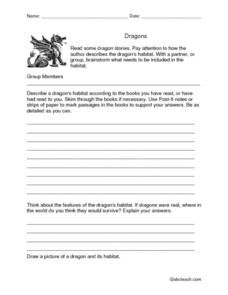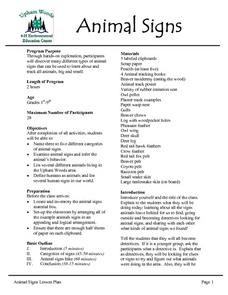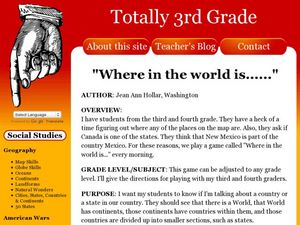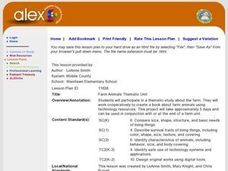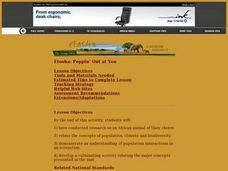Curated OER
Farming Number 6
In this environment worksheet, students identify and explain the importance of water and farming. They identify the differences between food items and whether they are a fruit, vegetable, or animal. Students also respond to 5 yes/no...
Curated OER
Help the Mommy Animal Find Her Babies
In this language arts activity, learners learn the names of mother animals and the babies by examining 4 sets of pictures. Using the word bank, students write the names by the pictures of the big and little animals. Then learners trace...
Curated OER
Animal Alphabet Word Search
For this vocabulary worksheet, students locate 26 specific animal names in a word search puzzle. There is one animal name for every letter of the alphabet.
Curated OER
Barnyard Bingo
In this fact and myth worksheet about farm animals, young scholars read 25 statements about common farm animals. Students shade only the boxes that contain true statements. If young scholars get them all right, they will have 12 shaded...
Curated OER
Polar Animal Wheel
In this animals worksheet, students create a polar animal wheel. Animals include a walrus, penguin, reindeer, and polar bear.
Curated OER
Dragons: Read and Brainstorm a Habitat
In this brainstorming instructional activity, 4th graders will work in small groups to brainstorm what a dragon's habitat should be like. Students are asked to review books they have read about dragons to support their answers.
Curated OER
Where Do They Live?
In this animal habitat worksheet, young scholars color a picture of 3 habitats. They then cut and color 12 animal pictures. Students paste the animals in the spaces, according to where they live.
Curated OER
Animals And Behavior
In this animal behavior worksheet, students solve four different kinds of puzzles based on animal behavior vocabulary. There are 8 word scrambles, 6 analogies, 5 crazy eights and 5 short answer questions.
Curated OER
Migration Nation
Students study the concept of animal migration. They explore the migratory patterns of four different animals. Specifically, they search for on-line information about the natural history of animals and explore reasons why animals might...
Curated OER
A Wild Family Album!
Young scholars create a scrapbook style family album for a selected animal. They complete an interactive Internet activity on research reports, fill out a graphic organizer, diagram a food web, and complete their scrapbook that includes...
Curated OER
Animal Signs
Students discuss the many different types of animal signs that can be used to identify and track all types of animals. They examine tracks, trails, homes, territory markings, and even "scat" left by animals and attempt to identify the...
Curated OER
Animal Signs
Students discuss the many different types of animal signs that can be used to identify and track animals. They participate in an hands-on activity in which they examine tracks, trails, homes, territory markings, and even "scat" left by...
Curated OER
Wildlife Management
Students examine the effects of various management strategies on the size of wildlife populations. Each student simulates the management of an animal population in a card game, graphs the results of the wildlife game, and participate in...
Curated OER
Cold and Warm Blooded Animals
Students research facts about a cold or warm-blooded animal in order to designa report either as PowerPoint or word processed document. They use online resources and insert images in to the report. They include the specified criteria and...
Curated OER
Cells, Cells, Cells
Students explore plant and animal cells. Using household items, students create a three-dimensional model of a plant or animal cell. Students identify and label each cell part.
Curated OER
Australian Mammals: Evolutionary Development as a Result of Geographic Isolation
Students comprehend the difference between monotremes, marsupials, and placental mammals. They are able to compare and contrast these organisms (Australian mammals) with other mammals. Students are able to identify Australian mammals.
Curated OER
Where in the World is...?
Students work in groups to locate an appropriate planet where inhabitants of a fictional place can be relocated. They create a PowerPoint presentation to introduce their relocation site, as well as ecosystem information about the site....
Curated OER
Termite Trail Marking Behavior
Students examine termites and their trail-marking behaviors. They draw lines on paper with various ink pens and experiment to see which types of ink the termites follow--or which inks do and do not elicit trail marking behavior.
Curated OER
Farm Animals Thematic Unit
Student study farm animals by watching a teacher made PowerPoint presentation and visiting a farm. They research a farm animal with teacher assistance. They design a book about the animals using available technology and orally present...
Alabama Learning Exchange
Animals as Pets: Everything You Need to Know
Students complete internet based research on pet care in order to prepare a written and oral presentation for the class. They examine the life span, environment, food and grooming of the pet they chose to research. They complete the...
Curated OER
What Is Happening To My Species?
Learners select and research an animal that lives in the rainforest of Manu, Peru. They watch and discuss a video, create masks and costumes to role-play various rainforest animals, conduct research, and write a short story of their...
Curated OER
The Deadly Frogs of Manu
Students investigate the poisonous frogs of Manu, Peru. They watch and discuss a video, conduct Internet research on poison frogs, accurately color downloaded template models of the frogs of Manu, and create a poster using the colored...
Curated OER
Etosha: Poppin' Out at You
Tenth graders research an African animal of their choice and relate the concepts of population, climate and biodiversity to their animal. They examine how population interacts in an ecosystem.
Curated OER
Let's Go to the Farm!
Discover the animals which live on a farm through listening to a story about farm animals and conduct a simple research. Youngsters will create a class Web site about farm animals and provide information about each animal.







